By David Pan · Monday, August 29, 2022 Save 20% on the paperback edition of The Travails of Trumpification by purchasing it in our online store and using the coupon code BOOKS20 during checkout.
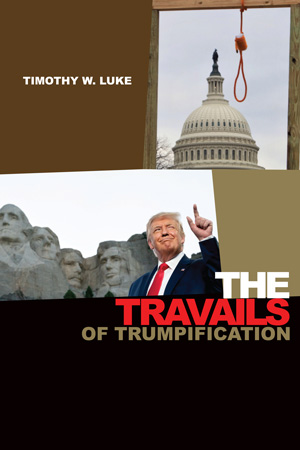 The disagreement about the propriety of the FBI’s search of Donald Trump’s residence reveals a fundamental divide over the proper role of the federal government. On the one hand, the defenders of the search have emphasized the rule of law and the idea that no one should stand above the law. From this perspective, Trump represents a danger to democracy itself, which the federal government is defending. On the other hand, for Trump supporters the search epitomizes the all-encompassing reach of the federal government into people’s daily lives and thus a further example of the erosion of freedom in the United States. The uncomprehending attitude of each side toward the other exemplifies the ways in which “the travails of Trumpification,” as described by Tim Luke, do not represent a passing phenomenon. As three recent reviews of Luke’s book emphasize, Trumpism is a complex phenomenon that is not just about Donald Trump. Populism predates Trump’s rise by more than a century, and the motivating attitudes and ideas will surely continue to shape American politics after he is gone. The focus on Trump the man has led, for both supporters (not least Trump himself) and detractors, to a failure to address the broader currents that he has been able to mobilize. The disagreement about the propriety of the FBI’s search of Donald Trump’s residence reveals a fundamental divide over the proper role of the federal government. On the one hand, the defenders of the search have emphasized the rule of law and the idea that no one should stand above the law. From this perspective, Trump represents a danger to democracy itself, which the federal government is defending. On the other hand, for Trump supporters the search epitomizes the all-encompassing reach of the federal government into people’s daily lives and thus a further example of the erosion of freedom in the United States. The uncomprehending attitude of each side toward the other exemplifies the ways in which “the travails of Trumpification,” as described by Tim Luke, do not represent a passing phenomenon. As three recent reviews of Luke’s book emphasize, Trumpism is a complex phenomenon that is not just about Donald Trump. Populism predates Trump’s rise by more than a century, and the motivating attitudes and ideas will surely continue to shape American politics after he is gone. The focus on Trump the man has led, for both supporters (not least Trump himself) and detractors, to a failure to address the broader currents that he has been able to mobilize.
Continue reading →
By David Pan · Monday, August 15, 2022 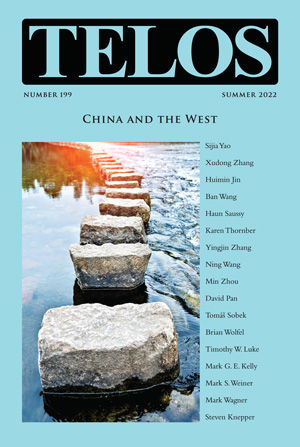 If we are seeing a rise in political violence today, is the main cause a decline in tolerance? On today’s episode of the Telos Press Podcast, I discuss the concept of tolerance with Tomáš Sobek, whose essay on the subject appeared in Telos 199. He argues that tolerance cannot be equated with liberalism, or rather that there are two ways of understanding the meaning of liberalism. While a positive form of liberalism contains a set of values that today would include support for abortion rights and gay marriage, a negative form of Liberalism (let’s call it Liberalism with a capital L) is limited to tolerating viewpoints or practices that one does not agree with. From this perspective, Liberal tolerance would include a conservative opposed to abortion who is willing to tolerate its practice. On the other hand, liberal (with a small l) tolerance would not include tolerating gay marriage, which the liberal in any case supports, meaning there is nothing to tolerate. Since one only tolerates something with which one is in disagreement, liberal tolerance would have to include something like tolerance of racism, even though one opposes it. Of course, it may be that some things are not to be tolerated, for instance murder, and some anti-abortion advocates would classify abortion as a form of murder and therefore intolerable, and liberal anti-racists might similarly classify racist prejudice as intolerable, to the point of advocating violence to oppose it. If we are seeing a rise in political violence today, is the main cause a decline in tolerance? On today’s episode of the Telos Press Podcast, I discuss the concept of tolerance with Tomáš Sobek, whose essay on the subject appeared in Telos 199. He argues that tolerance cannot be equated with liberalism, or rather that there are two ways of understanding the meaning of liberalism. While a positive form of liberalism contains a set of values that today would include support for abortion rights and gay marriage, a negative form of Liberalism (let’s call it Liberalism with a capital L) is limited to tolerating viewpoints or practices that one does not agree with. From this perspective, Liberal tolerance would include a conservative opposed to abortion who is willing to tolerate its practice. On the other hand, liberal (with a small l) tolerance would not include tolerating gay marriage, which the liberal in any case supports, meaning there is nothing to tolerate. Since one only tolerates something with which one is in disagreement, liberal tolerance would have to include something like tolerance of racism, even though one opposes it. Of course, it may be that some things are not to be tolerated, for instance murder, and some anti-abortion advocates would classify abortion as a form of murder and therefore intolerable, and liberal anti-racists might similarly classify racist prejudice as intolerable, to the point of advocating violence to oppose it.
Continue reading →
By David Pan · Monday, August 8, 2022 Dear Telos readers,
I’m excited to invite you to attend a special event at the John D. Calandra Italian American Institute in New York City on October 14–15, 2022, to celebrate the 200th issue of Telos, which will be appearing in Fall 2022. You can register for the event at the Telos-Paul Piccone Institute website, at www.telosinstitute.net/telos200. The event will take place from 3 pm to 6 pm on October 14 and from 9 am to 5 pm on October 15. The admission is $100 for both days and includes a reception on October 14 and lunch on October 15.
The event will feature Joel Kotkin (author of The New Class Conflict) and Michael Lind (author of The New Class War: Saving Democracy from the Managerial Elite) as keynote speakers, who will discuss the new politics of class.
Continue reading →
By David Pan · Monday, August 1, 2022 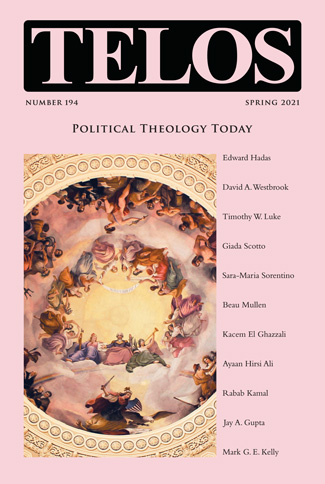 Concerns about inflation can lead us to exaggerate the role of money in the economy. In his essay on “Three Rival Versions of Monetary Enquiry,” in Telos 194, Edward Hadas argues that money is not at the center of economics. Instead, economics is fundamentally about what he calls the “Great Exchange,” in which people offer labor that changes the world and the world in return provides gifts to people in the form of goods and services. At its basis, this exchange involves the relationship between humans and nature, as well as the ways in which humans decide to manage this relationship. Though it can go on with or without money, money is very useful for managing the individual elements of the Great Exchange. As the mediator of the details of the Great Exchange, money is in fact neutral, neither a nefarious underminer of human relations nor a key to prosperity. Concerns about inflation can lead us to exaggerate the role of money in the economy. In his essay on “Three Rival Versions of Monetary Enquiry,” in Telos 194, Edward Hadas argues that money is not at the center of economics. Instead, economics is fundamentally about what he calls the “Great Exchange,” in which people offer labor that changes the world and the world in return provides gifts to people in the form of goods and services. At its basis, this exchange involves the relationship between humans and nature, as well as the ways in which humans decide to manage this relationship. Though it can go on with or without money, money is very useful for managing the individual elements of the Great Exchange. As the mediator of the details of the Great Exchange, money is in fact neutral, neither a nefarious underminer of human relations nor a key to prosperity.
Continue reading →
By David Pan · Monday, July 18, 2022 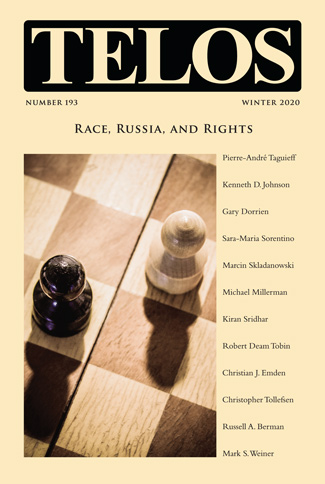 The extended nature of the war in Ukraine stems from the long-term political and ideological developments that have led up to it and will continue to dominate it. In Russia, the government has maintained support for the war through the promotion of a civilizational narrative about Russian culture that has been established over the last twenty years. As Marcin Skladanowski describes in “Criticism of Western Liberal Democracy by Patriarch Kirill of Moscow and All Rus'” (Telos 193), the Russian Orthodox Church has set up the conflict between Russia and the West as a moral one, in which Russia defends a divinely grounded morality against the amoral secularism of the West. This religiously grounded idea of a civilizational conflict exists alongside a philosophical explanation. In “The Ethnosociological and Existential Dimensions of Alexander Dugin’s Populism” (Telos 193), Michael Millerman describes Dugin’s Heideggerian attempt to establish civilizational differences between peoples as the basis for an anthropological theory of human existence. As Nikolai-Klaus von Kreitor recounts in “Elements of the New Russian Nationalism” (Telos 96), Dugin was already at work in the early 1990s on such ideas when he developed Carl Schmitt’s theory of the Grossraum in order to criticize U.S. imperialism and justify a Eurasian regional hegemony to counter the dominance of the Western liberal order. The extended nature of the war in Ukraine stems from the long-term political and ideological developments that have led up to it and will continue to dominate it. In Russia, the government has maintained support for the war through the promotion of a civilizational narrative about Russian culture that has been established over the last twenty years. As Marcin Skladanowski describes in “Criticism of Western Liberal Democracy by Patriarch Kirill of Moscow and All Rus'” (Telos 193), the Russian Orthodox Church has set up the conflict between Russia and the West as a moral one, in which Russia defends a divinely grounded morality against the amoral secularism of the West. This religiously grounded idea of a civilizational conflict exists alongside a philosophical explanation. In “The Ethnosociological and Existential Dimensions of Alexander Dugin’s Populism” (Telos 193), Michael Millerman describes Dugin’s Heideggerian attempt to establish civilizational differences between peoples as the basis for an anthropological theory of human existence. As Nikolai-Klaus von Kreitor recounts in “Elements of the New Russian Nationalism” (Telos 96), Dugin was already at work in the early 1990s on such ideas when he developed Carl Schmitt’s theory of the Grossraum in order to criticize U.S. imperialism and justify a Eurasian regional hegemony to counter the dominance of the Western liberal order.
Continue reading →
By David Pan · Monday, June 20, 2022 Telos 199 (Summer 2022): China and the West is now available for purchase in our store. Individual subscriptions to Telos are also available in both print and online formats.
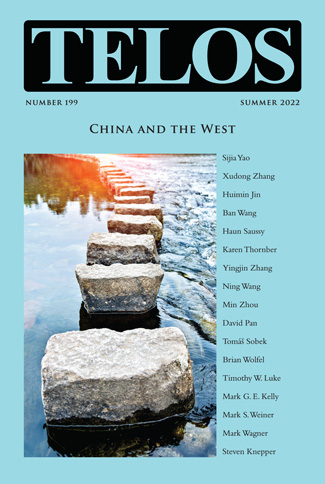 The comparison of China and the West is in the first place a cultural problem to the extent that it requires a knowledge of both traditions and the ways in which they have related to each other. There has been a long history of interaction that has shaped the global economy from the times of the silk routes to the early modern push to find an alternative trade route to China in the European age of discovery and conquest. But the cultural comparison between China and the West today is inevitably overshadowed by a political dynamic in which the opposition reveals a rivalry that no longer exists, for instance, between Japan and the West. Indeed, the “West” in the opposition between China and the West could even be interpreted to include Japan or Taiwan. While the political opposition between China and the West may be reduced to the difference between authoritarianism and liberal democracy, this political dichotomy leads to cultural differences that result from the incompatibility between the two public spheres. While different public spheres will always manifest inconsistencies in terms of the problems and concerns that structure discussion and debate, China’s contemporary restrictions on free expression have separated it from the rest of the world in a more fundamental way by establishing an alternative version of historical facts. China’s alternative reality is not a consequence of its grounding in its distinctive cultural tradition but of the political decisions that have cut it off from the rest of the world. The attempt to compare China and the West must therefore take into account this politically enforced disjuncture. The comparison of China and the West is in the first place a cultural problem to the extent that it requires a knowledge of both traditions and the ways in which they have related to each other. There has been a long history of interaction that has shaped the global economy from the times of the silk routes to the early modern push to find an alternative trade route to China in the European age of discovery and conquest. But the cultural comparison between China and the West today is inevitably overshadowed by a political dynamic in which the opposition reveals a rivalry that no longer exists, for instance, between Japan and the West. Indeed, the “West” in the opposition between China and the West could even be interpreted to include Japan or Taiwan. While the political opposition between China and the West may be reduced to the difference between authoritarianism and liberal democracy, this political dichotomy leads to cultural differences that result from the incompatibility between the two public spheres. While different public spheres will always manifest inconsistencies in terms of the problems and concerns that structure discussion and debate, China’s contemporary restrictions on free expression have separated it from the rest of the world in a more fundamental way by establishing an alternative version of historical facts. China’s alternative reality is not a consequence of its grounding in its distinctive cultural tradition but of the political decisions that have cut it off from the rest of the world. The attempt to compare China and the West must therefore take into account this politically enforced disjuncture.
It would be a mistake, though, to see China and the West as polar opposites or competing civilizations, separated by their opposing political interests on the one hand and by the history of each of their cultural traditions on the other hand. Even if they had separate long histories, the recent past has seen many more opportunities for interaction and orientation around common projects and problems. Moreover, since the past is always a projection from out of the present, the idea of a clash of civilizations is not a legacy but a project. An alternative endeavor would be to conceive of the relationship between China and the West as existing within a larger totality. The definition of such a totality must occur within a particular perspective, however, and therein lies the problem. China and the West are clearly competing to define the framework of global order. Consequently, any attempt to consider the relationship between the two must look to the vision of universality that each side is trying to establish against the other. This issue of Telos considers a variety of ways of defining the overarching perspective from which the comparison between China and the West makes sense.
Continue reading →
|
|
 The disagreement about the propriety of the FBI’s search of Donald Trump’s residence reveals a fundamental divide over the proper role of the federal government. On the one hand, the defenders of the search have emphasized the rule of law and the idea that no one should stand above the law. From this perspective, Trump represents a danger to democracy itself, which the federal government is defending. On the other hand, for Trump supporters the search epitomizes the all-encompassing reach of the federal government into people’s daily lives and thus a further example of the erosion of freedom in the United States. The uncomprehending attitude of each side toward the other exemplifies the ways in which “the travails of Trumpification,” as described by Tim Luke, do not represent a passing phenomenon. As three recent reviews of Luke’s book emphasize, Trumpism is a complex phenomenon that is not just about Donald Trump. Populism predates Trump’s rise by more than a century, and the motivating attitudes and ideas will surely continue to shape American politics after he is gone. The focus on Trump the man has led, for both supporters (not least Trump himself) and detractors, to a failure to address the broader currents that he has been able to mobilize.
The disagreement about the propriety of the FBI’s search of Donald Trump’s residence reveals a fundamental divide over the proper role of the federal government. On the one hand, the defenders of the search have emphasized the rule of law and the idea that no one should stand above the law. From this perspective, Trump represents a danger to democracy itself, which the federal government is defending. On the other hand, for Trump supporters the search epitomizes the all-encompassing reach of the federal government into people’s daily lives and thus a further example of the erosion of freedom in the United States. The uncomprehending attitude of each side toward the other exemplifies the ways in which “the travails of Trumpification,” as described by Tim Luke, do not represent a passing phenomenon. As three recent reviews of Luke’s book emphasize, Trumpism is a complex phenomenon that is not just about Donald Trump. Populism predates Trump’s rise by more than a century, and the motivating attitudes and ideas will surely continue to shape American politics after he is gone. The focus on Trump the man has led, for both supporters (not least Trump himself) and detractors, to a failure to address the broader currents that he has been able to mobilize.





